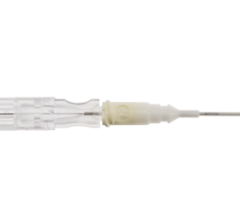November 10, 2009 – Onset Medical Corp. today said it received U.S. FDA 510(k) marketing clearance for its SoloPath TransFemoral Endovascular Access Catheter. It is designed to provide access to diseased arteries at a relatively small catheter size and then is expanded to provide a conduit for the delivery of larger diameter devices.
The SoloPath may help broaden the number of patients who can be effectively treated percutaneously with femoral/iliac artery stent grafts, aortic stent grants and new technology such as the percutaneous aortic heart valves that are now marketed in Europe and under clinical study in the United States.
The company said SoloPath is an enabling platform that can establish a repeatable and predictable method of access. The company also said the device may help reduce patient contraindications and enable a larger patient population. Another major clinical market for the SoloPath Catheter is in the delivery of stent grafts for the treatment of aortic aneurysms. These aortic stent grafts require very large catheter delivery systems. They are implanted minimally invasively as a substitute for conventional open surgical procedures to treat ruptured aneurysms. The annual market for such stent grafts is approximately $300 million and growing 25 percent per year.
The SoloPath Endovascular Access Catheter uses Onset’s Controlled Deployment Technology (CDT) in a new and different approach to procedures requiring minimally invasive access to remote sites within the body. The SoloPath enters the body at approximately one-half the diameter of conventional access sheaths, is very flexible and provides superior navigation through the vascular anatomy. Once in position, the device is deployed utilizing radial expansion to expand the sheath and remodel the tissue/vasculature in order to provide unrestricted access for the delivery of therapeutic devices. Early studies indicate that this Controlled Deployment Technology can allow the physician to perform an easy, one-step access procedure, which can potentially reduce vascular/tissue trauma and virtually eliminate the need for other preoperative steps (e.g., vascular stenting), which are often required for access with conventional devices.
The SoloPath allows minimally invasive access in a manner that is potentially less traumatic to the arterial vasculature compared to devices currently in use. By eliminating a number of surgical maneuvers, use of the SoloPath may reduce procedural time, surgical expense and patient recovery time. Onset has a strong intellectual property foundation including numerous patents pending surrounding the SoloPath access technology.
The company will introduce the access catheter in a select group of hospitals to further study the SoloPath versus current, conventional access devices. A broader market launch is planned for early 2010.
For more information: www.onsetmedical.com


 October 28, 2025
October 28, 2025 









